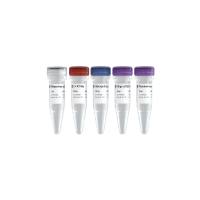Synthesis of Chemokines
互联网
635
Solid phase peptide synthesis (SPPS) is an alternative to DNA expression for generating proteins, such as chemokines (1 –1 ). DNA databases and cDNA cloning has resulted in an explosion in the number of new chemokines from 1995-1998. However, for studies of the protein, knowing the DNA sequence is only the first step. The chemokine must be generated and in its correctly processed and folded form, and then purified to homogeneity. Expression of the cDNA is the popular route to the protein; however, de novo chemical synthesis has some significant advantages (e.g., efficient SPPS can provide 10-100 mg of pure chemokine in only a few days). Chemically synthesized chemokines have the same three-dimensional structures as ribosome-assembled chemokines made by recombinant DNA expression (3 –5 ,7 ,9 ,10 ). Functionally, they are indistinguishable. The cumulative results of our chemokine studies have shown that chemical synthesis is a straightforward route to chemokines and their analogs. In this chapter, I describe the principles and procedures that colleagues and I have developed for synthesis of chemokines (1 –11 ). Despite many advantages (see Subheading 1.1. , step 1 –10 ), peptide synthesis has not been widely applied to proteins. One reason is that most researchers approach proteins from a biological, rather than a chemical, standpoint. Another is that in the early days of SPPS, the methods were limited to short peptides. However, gradual optimization of the chemistry eventually led to the synthesis of small proteins (12 –14 ). Although the individual steps involved are straightforward, the methods require hands-on experience and a firm understanding of the principles involved.






